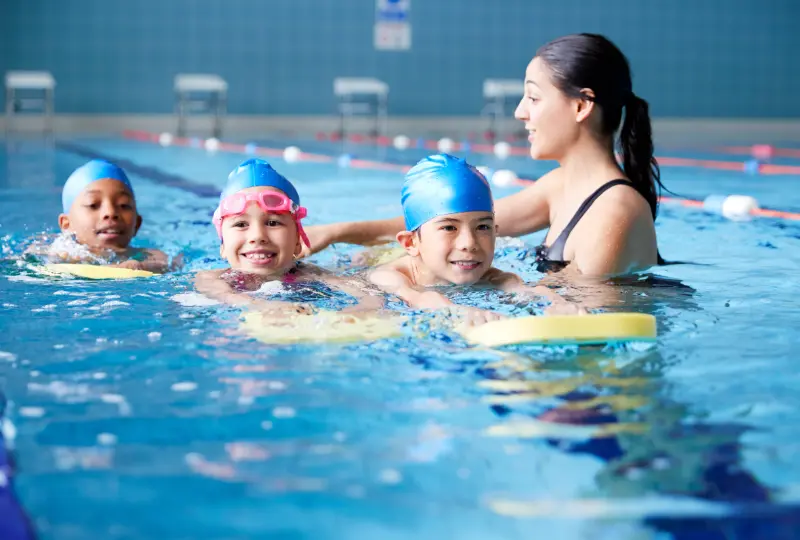Swimming is more than a fun activity for kids — it’s also one of the healthiest and most rewarding forms of exercise. And knowing how to swim can be a lifesaver.
From physical and mental fitness to life-saving water safety skills, swimming is the gateway to a healthier, happier, and more confident child.
This blog highlights the most powerful benefits of swimming for children, clarifying why every parent or childcare provider should encourage kids to take the plunge.
1. Builds Physical Strength & Fitness
Swimming is a full-body workout that engages nearly every muscle group without stressing the joints. It’s particularly suitable for children, as their developing bodies benefit from low-impact exercise.
Key Physical Benefits
- Improves cardiovascular endurance
- Builds core, arm, and leg strength
- Enhances flexibility and coordination
- Promotes healthy weight management
Children who swim regularly are stronger and more energetic in general. This makes swimming an ideal choice to keep kids active year-round.
2. Enhances Water Safety Skills
Drowning is one of the leading causes of accidental death among children, making early swimming lessons critical.
Water Safety Skills Include
- Recognizing and avoiding dangerous swimming conditions
- Floating, treading water, and basic survival strokes
- Confidence to stay calm in potentially unsafe water situations
These critical capabilities empower kids to enjoy water-related activities safely.
3. Develops Social Skills
Swimming lessons and swim teams are prime environments for children to build social skills. Kids learn to interact with coaches, fellow swimmers, and lifeguards.
Key Social Benefits
- Learning how to follow instructions
- Building friendships and teamwork skills
- Gaining confidence through group activities
Participating in a swim class can boost kids’ confidence and sense of belonging while also teaching them patience and cooperation.
4. Improves Mental Health & Emotional Well-being
Like other forms of exercise, swimming reduces stress and promotes happiness by stimulating endorphins, the brain’s “feel-good” chemicals.
Mental Health Benefits of Swimming
- Relieves stress and anxiety
- Boosts self-esteem through skill-building
- Enhances focus and mental clarity
- Offers a therapeutic, calming experience
For children with high stress or sensory sensitivities, swimming’s rhythmic nature can foster relaxation and emotional balance.
5. Strengthens Cognitive Development
Swimming has been linked to improved cognitive functioning in children. Studies show that it helps with brain development due to its unique combination of physical activity and coordination. Simply put, swimmers are smarter!
Cognitive Benefits
- Encourages motor skill development through synchronized movements
- Enhances spatial awareness and problem-solving abilities
- Improves memory and focus
Swimming’s cognitive boosts translates into greater learning potential in and out of the water.
6. Encourages Discipline & Goal Setting
Swimming lessons often include clear objectives, such as learning different strokes or achieving specific milestones. These elements teach kids the value of discipline, perseverance, and goal-oriented behavior.
How Swimming Encourages Discipline
- Following structured lessons and routines
- Working to improve swim techniques over time
- Celebrating achievements, big or small
Children carry this determination to other areas, including schoolwork and extracurricular activities.
7. Provides a Fun & Versatile Activity
Swimming combines fitness with fun, making it more appealing for kids than other forms of exercise. From playing games in the pool to learning creative dives, swimming offers endless opportunities for enjoyment.
Fun Ways Kids Enjoy Swimming
- Pool games like water polo or treasure hunts
- Recreational activities in water parks or at the beach
- Exploring aquatic environments like lakes or snorkeling
With the bonus of fun, kids are more likely to adopt an active lifestyle when swimming becomes part of their routine.
8. Boosts Immunity & Overall Health
Swimming in well-maintained pools helps improve lung capacity and promotes cardiovascular health. Additionally, exposure to various environments strengthens kids’ immune systems.
Health Benefits Include
- Strengthened lungs and respiratory system
- Improved blood circulation
- Enhanced immune adaptability
Starting the habit of swimming early can lay the foundation for a lifetime of better health and wellness.
FAQs: Benefits of Swimming for Kids
Q: When should my child start swimming lessons?
Children as young as one year old can begin water introduction classes. Formal swimming lessons are typically recommended starting at age four when developmental readiness aligns with learning basic swim strokes.
Q: Is it okay for children with asthma to swim?
Swimming is one of the best sports for children with asthma. It builds the lungs and is conducted in a humid environment that reduces breathing difficulties.
Q: How often should kids swim to see benefits?
Children should swim at least 2–3 times a week for maximum benefits. However, even just one session a week can contribute to fitness and water safety skills.
Q: What age is too late to learn swimming?
There’s no age limit to learning how to swim! While younger children adapt quickly, older kids and adults can gain water competency and enjoy swimming.
Q: Do children need gear to start swimming?
Basic gear like swimsuits, goggles, and swim caps (for kids with long hair) is sufficient for beginners. Fins or kickboards can help with advanced swimming.
Q: Are swimming pools safe for kids?
Yes, with proper supervision. Ensure pools follow health and safety standards, including clean water, trained lifeguards, and appropriate depth areas for children.
Q: How can swimming help children with special needs?
Swimming is often therapeutic for special needs kids. It enhances motor coordination, reduces stiffness, and offers sensory benefits.
Q: What’s a good way to motivate kids while learning to swim?
Celebrate progress — no matter how small. Positive reinforcement, fun games, and small incentives like stickers or certificates can keep kids excited about swimming.



Leave A Comment